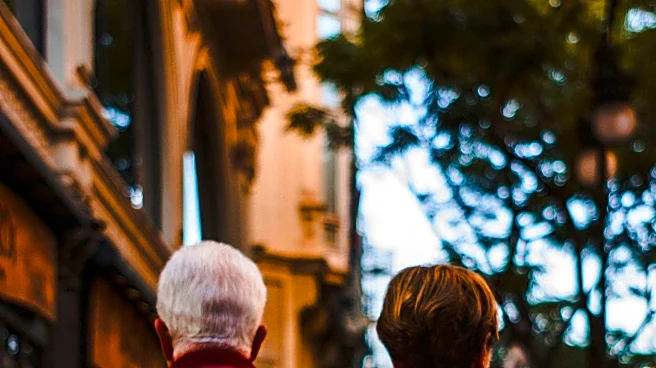What's Happening?
The article explores the dynamics of age-gap relationships, particularly focusing on straight men and their perspectives. It highlights the views of Akua K. Boateng, a psychotherapist, who notes that in some
cultures, age-gap relationships are seen as exchanges of wisdom and vitality, requiring mutual agreement and shared values. Sabrina Zohar, a dating coach, expresses discomfort with significant age gaps, citing potential power imbalances and manipulation. The article includes anecdotes from men in age-gap relationships, discussing their experiences and the societal perceptions they face. It emphasizes the importance of compatibility, maturity, and mutual respect in making such relationships work.
Why It's Important?
Age-gap relationships often face societal scrutiny due to perceived power imbalances and differing life stages. The discussion by experts like Boateng and Zohar sheds light on the complexities involved, emphasizing the need for mutual respect and shared values. These relationships can challenge traditional norms and highlight the evolving nature of romantic partnerships. Understanding these dynamics is crucial for fostering healthy relationships and addressing societal biases. The insights provided can influence public perception and encourage more nuanced discussions about relationship dynamics, potentially impacting social attitudes and relationship counseling practices.
What's Next?
The article suggests that for age-gap relationships to thrive, both partners must actively work against using their advantages as leverage. This includes avoiding financial control and ensuring equal say in major decisions. As societal attitudes continue to evolve, there may be increased acceptance of diverse relationship dynamics, provided they are based on mutual respect and equality. Future discussions may focus on how these relationships can be supported through counseling and public awareness campaigns, promoting healthy dynamics and challenging stereotypes.
Beyond the Headlines
The exploration of age-gap relationships touches on deeper societal issues such as ageism and the evolving nature of romantic partnerships. It raises questions about the ethical implications of power dynamics and the role of cultural norms in shaping relationship expectations. The discussion encourages a reevaluation of traditional relationship models, potentially leading to broader acceptance of diverse partnerships. This could influence cultural narratives and contribute to more inclusive societal attitudes towards relationships.









